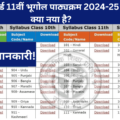UGC allows universities to admit students twice a yearUniversity Grants Commission has said that biannual admissions are not mandatory, but the decision now provides “flexibility” to institutions; biannual admission system can apply to PhD, postgraduate and undergraduate programmes.
Flexibility in Admission Cycles:
The University Grants Commission (UGC) has now allowed higher education institutions to admit students twice a year. While earlier regulations allowed students to be admitted only during July-August, the UGC’s recent decision means that students can now be admitted in January/February and in July/August during the upcoming academic session.

The UGC’s decision now leaves it to the institutions to decide if they want to offer admissions in both cycles or just one, and this will depend on their infrastructure and faculty.The UGC has said that biannual admissions are not mandatory, but the decision now provides “flexibility” to institutions that might want to “increase their student intake and offer new programmes in emerging areas.”UGC Chairman M Jagadesh Kumar told “Every university offers admissions in July/August.
In addition to this, if they wish to offer programmes in January, they are welcome to.”“The situation can be unique to a particular institution; the challenges can vary from institution to institution. The UGC provides the broader regulatory framework enabling the institutions to work out the details themselves and implement it if they think they can do,” he added.
On whether universities may now be able to offer admissions to different sets of courses in the two admission cycles, he said: “It is a choice for them…depending on the infrastructure that is available. For a science programme, if they find that for the students admitted in the July session lab facilities are used in the daytime, they may want to use lab facilities in the evening for the session that began in January, so that there is better utilisation of resources available in universities.”
Implementation Process:
The UGC first attempted this biannual admission process with open and distance learning (ODL), and online mode programmes.On why the UGC decided to allow biannual admissions, Kumar said that during the trials in ODL and online the UGC found that nearly half a million students who would have otherwise waited for one year to join these programmes have got the opportunity to join in January itself.There is a possibility that even in the physical mode, students who have missed admissions for various reasons in July/August, will have the opportunity to join in January instead of waiting for one full year. It is also a global practice. It also has the potential to increase the GER (Gross Enrollment Ratio) also,” Jagadesh Kumar said.If universities now intend to begin a second session in January, they will have to get the decision approved in their academic and executive councils, and amendments will have to be made in their institutional regulations. This biannual admission system can apply to PhD, postgraduate and undergraduate programmes.
Impact on Entrance Exams:
In the case of programmes to which admissions are based on entrance exams, the UGC Chairman said, “For PhD admissions, currently all universities admit in July. We are conducting UGC-NET twice a year. So, universities can now begin to admit twice a year in PhD programmes. For postgraduate programmes, CUET (PG) is not mandatory, it is only an option and many universities admit based on their own entrance exam or marks in undergraduate programmes. Now they can offer biannual admissions in masters programmes”.Similarly in undergraduate programmes, except for central universities, CUET (UG) is not mandatory for other universities, he said. “They use a combination of admission criteria including CUET (UG) scores, their own entrance exam, board exam marks. If any university wants to start UG programmes in a second session, they are free to do it,” the UGC chairman mentioned.
On whether entrance exams may now have to be held twice a year, he added: “Entrance exams are now technology driven. Ideally, if they are conducted twice a year, it will be beneficial to students. One-by-one we are trying to implement that. Over a period of time, I hope we will have most entrance exams conducted by the NTA twice in a year”.


